G.Skill Phoenix Blade (480GB) PCIe SSD Review
by Kristian Vättö on December 12, 2014 9:02 AM ESTRandom Read/Write Speed
The four corners of SSD performance are as follows: random read, random write, sequential read and sequential write speed. Random accesses are generally small in size, while sequential accesses tend to be larger and thus we have the four Iometer tests we use in all of our reviews.
Our first test writes 4KB in a completely random pattern over an 8GB space of the drive to simulate the sort of random access that you'd see on an OS drive (even this is more stressful than a normal desktop user would see). We perform three concurrent IOs and run the test for 3 minutes. The results reported are in average MB/s over the entire time.
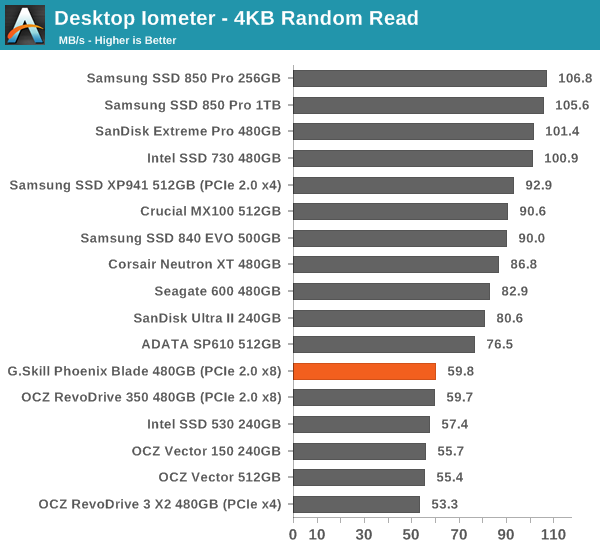
Random read speed is typical SandForce, which makes sense because the performance doesn't scale across multiple controllers at such low queue depths (QD=3 in this case).
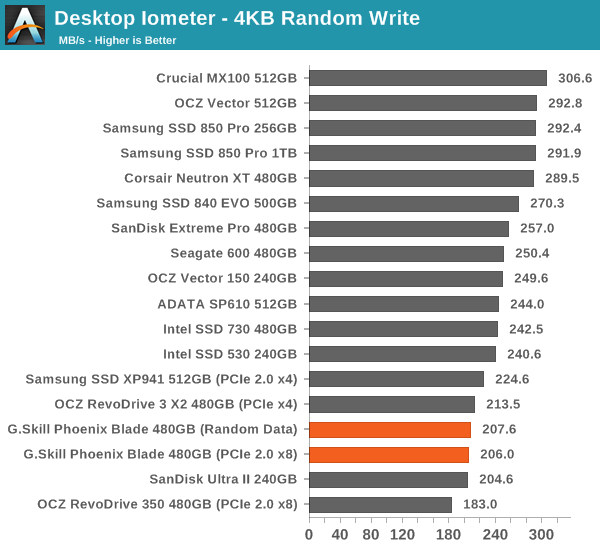
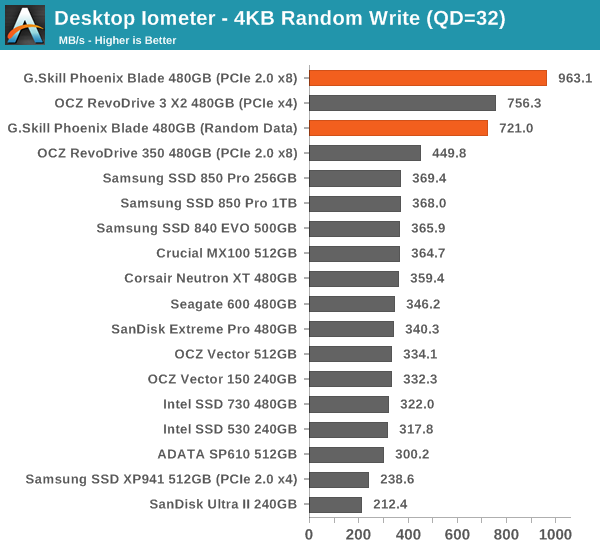
The same goes for random write performance at queue depth of 3, which isn't very high but is normal for SandForce based drives. However, the Phoenix Blade scales brilliantly with the queue depth and is considerably faster than the XP941 or RevoDrive 350.
Sequential Read/Write Speed
To measure sequential performance we run a 1 minute long 128KB sequential test over the entire span of the drive at a queue depth of 1. The results reported are in average MB/s over the entire test length.
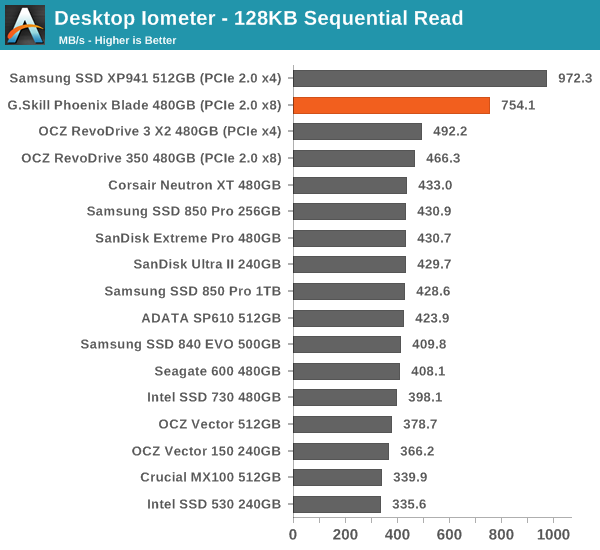
Sequential performance is also excellent, although the XP941 enjoys a slight advantage in sequential read performance. Overall the Phoenix Blade seems to be well optimized for parallelism -- much better than the RevoDrive 350 -- as it's able to provide substantially higher performance than SATA drives.
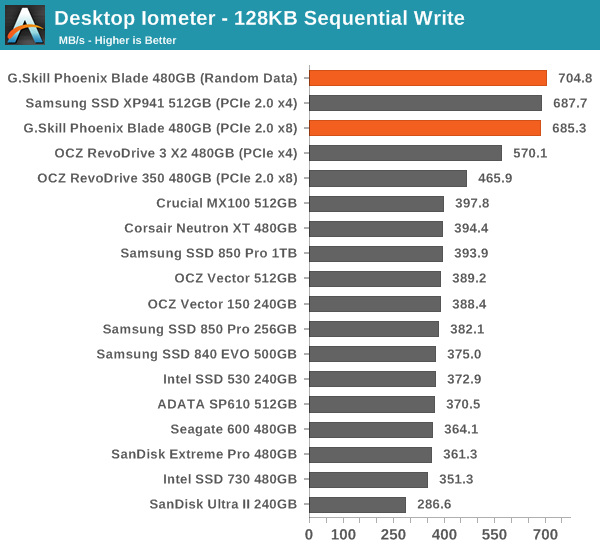
AS-SSD Incompressible Sequential Read/Write Performance
The AS-SSD sequential benchmark uses incompressible data for all of its transfers. The result is a pretty big reduction in sequential write speed on SandForce based controllers, but most other controllers are unaffected.
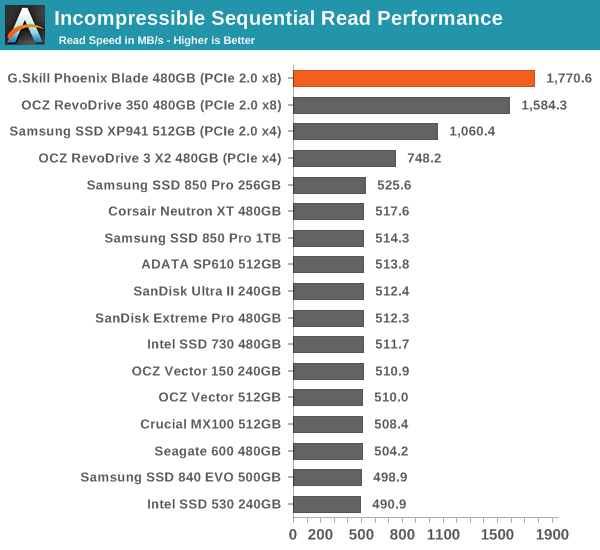
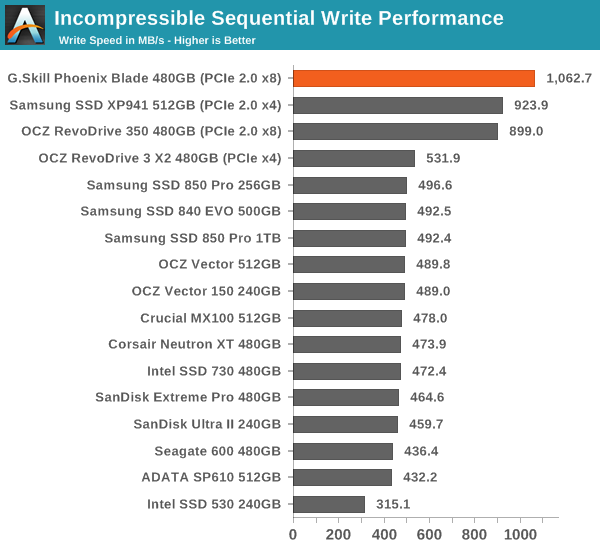










62 Comments
View All Comments
Supercell99 - Friday, December 12, 2014 - link
Did we ever found out about the endurance of the XP941? Is it artificially limited? The endurance of the GSKILL blade may actually make it worth an extra $200 if it can really hold up to that can of write endurance. http://www.anandtech.com/show/8006/samsung-ssd-xp9...Dug - Friday, December 12, 2014 - link
Ahh ok. Thank you for the response. My fault for not understanding the weight attributed to a certain benchmark.olderkid - Friday, December 12, 2014 - link
Any idea if we're going to see the Samsung SM951 anytime soon? It's all I've been waiting on for a new x99 build.Laststop311 - Saturday, December 13, 2014 - link
Bro i KNOW! I have been on the lookout for sm951 for a long time. When I saw this drive was going to be native pci-e 3.0 x4 m2 ssd + nvme + available in 1TB capacity I was like OMG this is my new drive I dont care what the price is it's 100% goin into my next build. That was like almost 6 months ago or something and still no word. I'm rly sad I hope it is still going to come out.I am not building till Skylake-E so i still have plenty of time. Even tho I am on gulftown i7-980x which is over 4 years old goin on 5 years it still isn't slow enough to be a bottleneck especially on 4.2Ghz OC. Not even upgrading for the cpu just for features I want like DDR4, PCI-E 4.0, ultra m2 slot, sata express, usb 3.0 that isnt from a third party controller (yes I don't have native usb 3.0 still). I still might buy somethign else other than a pc upgrade. This year I bought a 55" oled LG's 2nd gen 55" oled instead of a pc upgrade ( best decision ever it is eye searingly beautiful).
Laststop311 - Saturday, December 13, 2014 - link
3000 for 55" oled = WINpersonne - Friday, December 12, 2014 - link
I'm disappointed no RAID0 SSD setups were included. That's a cost effective option many people will explore which often has comparable performance. Three 850 Pros for 768GB is still less than this device.HoldDaMayo - Friday, December 12, 2014 - link
Well said, I was thinking the exact same thing.Kristian Vättö - Friday, December 12, 2014 - link
I don't have any sets of two drives, so I couldn't include any RAID 0 results here. I may provide an update later if I get my hands on some, though.personne - Friday, December 12, 2014 - link
I've often wondered why these kinds of review sites don't keep databases of results. I realize that the benchmark suites change and you're not a huge operation, but even having recent results to compare openly (using your own front end or even releasing open data) would really up this game and enable your users to participate better. I don't want to sound harsh, but it's 2014, reviewing sites have been around for yearly twenty years and they have changed little in format. Anandtech is easily one of the best, but many sites come down to a few pictures of results and some fairly arbitrary comments (Storage Review is one exception; since the start they've had a database where results can be arbitrarily compared). I hope sooner or later Wikipedia and other collective open benchmarking sites will start elevating comparison and I'd hope to see sites like Anandtech leading the way.Thanks for listening. (=
Kristian Vättö - Friday, December 12, 2014 - link
Well, we've had the Bench section with all of our benchmark data for as long as I can remember.http://www.anandtech.com/bench